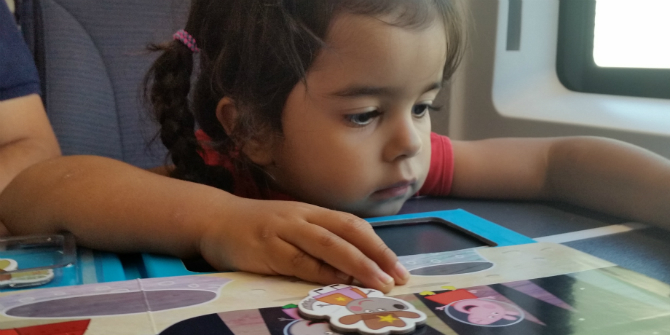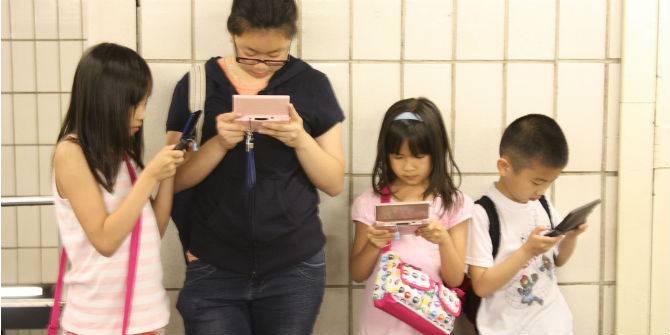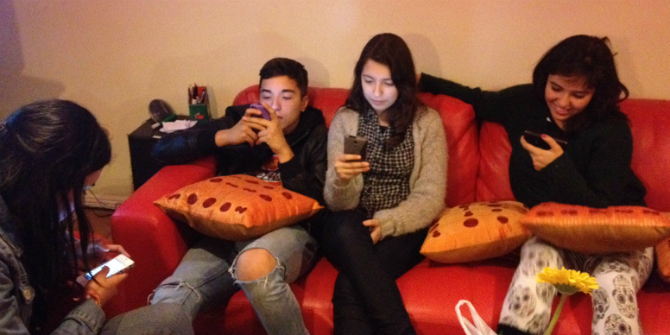 Rather than focusing on the ‘evils’ of constant internet connectivity (and smartphone over-use), Jane Vincent takes a closer look at the positives – how children can use smartphones to their best advantage to get on in an increasingly digital world. Jane Vincent is a senior academic researcher at the LSE and the University of Surrey with a background in the mobile communications industry. She was part of the UK team for the Net Children Go Mobile project and has studied children’s use of mobile phones and ICT since 2004. [Header image credit: B. Mical, CC BY-NC 2.0]
Rather than focusing on the ‘evils’ of constant internet connectivity (and smartphone over-use), Jane Vincent takes a closer look at the positives – how children can use smartphones to their best advantage to get on in an increasingly digital world. Jane Vincent is a senior academic researcher at the LSE and the University of Surrey with a background in the mobile communications industry. She was part of the UK team for the Net Children Go Mobile project and has studied children’s use of mobile phones and ICT since 2004. [Header image credit: B. Mical, CC BY-NC 2.0]
A smartphone is a ‘must have’ for children in Europe. With it comes the potential to access the entire World Wide Web, which quickly opens the door to a multitude of online opportunities, and risk. In both EU Kids Online and Net Kids Go Mobile projects, parents faced with handling the disruptive interventions into their household that this always-on, always-connected device conveys, told us about the constant challenges and difficulties it presents. Few speak about how much their children are using it to develop digital literacy and life skills, as well as to acquire new knowledge, which they then pass on and share with others.
Necessary for modern living
Looking at smartphone use from a child’s perspective, we can see they are an integral and important part of growing up as children climb the ladder of online opportunities. Each generation of children brings a new set of eyes to the array of digital devices, apps and online offerings that help them hone their social skills and explore what it means to be ‘me’. As they do this, they are having fun while learning how to cope with the new challenges and risks they encounter along the way.
Going online is not, of course, exclusive to a smartphone, and they may use more than one device at a time, such as doing homework on a laptop, or text messaging, or playing a game on their pc while chatting to friends on their smartphone.
Children are very cost conscious and quickly learn how to access the internet for free, but beyond that, being online through any device is how they remain constantly connected to their chosen friends, family, information and entertainment sources. Mostly, however, their preferred device is their mobile. Parents, meanwhile, find themselves in unfamiliar territory as they look for ways to keep their children’s voracious appetite for smartphone use within reasonable limits without it becoming a source of conflict.
In contrast with the all-round skills that parents develop over many more years of exposure to different devices in multiple contexts, children’s experience is narrowed to fewer areas of deeper learning. They find out how to navigate the digital landscape they inhabit as they progress through different life stages experienced with their peers in each school year.
Advisers, explorers, problem-solvers, sharers…
There are many positive aspects of smartphone use for children, as I explain in my report for LSE’s journalism think tank POLIS, that describes how children explore mobile opportunities, showing how children with digital literacy skills can be advisers, explorers, problem-solvers and sharers.
Interacting with children in the context of one of these categories and encouraging them to share their positive smartphone experiences might help parents and other adults to better understand children’s attachment to their smartphones.
Children usually find out how to do things on their smartphone by working it out for themselves, looking online and asking other children. Parents are also important, such as when a child turns to a parent for help and reassurance about the legitimacy of an app, or have been cheated out of money by a misunderstood ‘free’ offer or accidentally clicked ‘accept’. In turn, the children become the ‘expert’, passing on their knowledge as advisers to their peers and younger children. This acquired knowledge is invaluable to others, especially in smaller language communities where less information is available online.
This interest in seeking advice and searching for information draws them deeper into the possibilities that a smartphone affords. Explorers are those who push the limits and do not mind if they encounter hazards along the way. In fact, the greater the hazard, the more fun it is. But they also make their parents anxious, especially if the child is the more digitally literate.
Some children’s inquisitive activity enables them to develop skills as problem-solvers as they overcome difficulties with their mobile, and as they negotiate the challenges of online communities that push them beyond their comfort zone.
Children as sharers use their mobiles to collaborate with others online and to participate in civic communities, as well as for the traditional gift-giving¹ of sending and receiving photos or letting a friend use their mobile.
To some extent all children are sharers and problem-solvers, behaviours that are exemplary of broader online communities that are growing apace, such as when playing Minecraft, reading news media or searching for information.
Savvy smartphone users
Parents should be aware of the importance of smartphones to their children’s social and educational development, and must be open to the notion that they can learn from their children, especially when it comes to developing strategies for keeping safe online. Children are savvy smartphone users, they hate pop-ups, being ripped off or being exploited because they are children, and not being able to share stuff they like with younger children because of inappropriate adverts or content.
Help your child to reach their mobile digital literacy potential by letting them share their knowledge of positive mobile opportunities and how they are solving smartphone and mobile internet problems – they may well know more than they are being given credit for.
NOTES
¹ See Taylor, A. S., & Harper, R. (2002). Age-old practices in the “new world”: a study of gift-giving between teenage mobile phone users. CHI Letters, 4 (1), 439–446.






